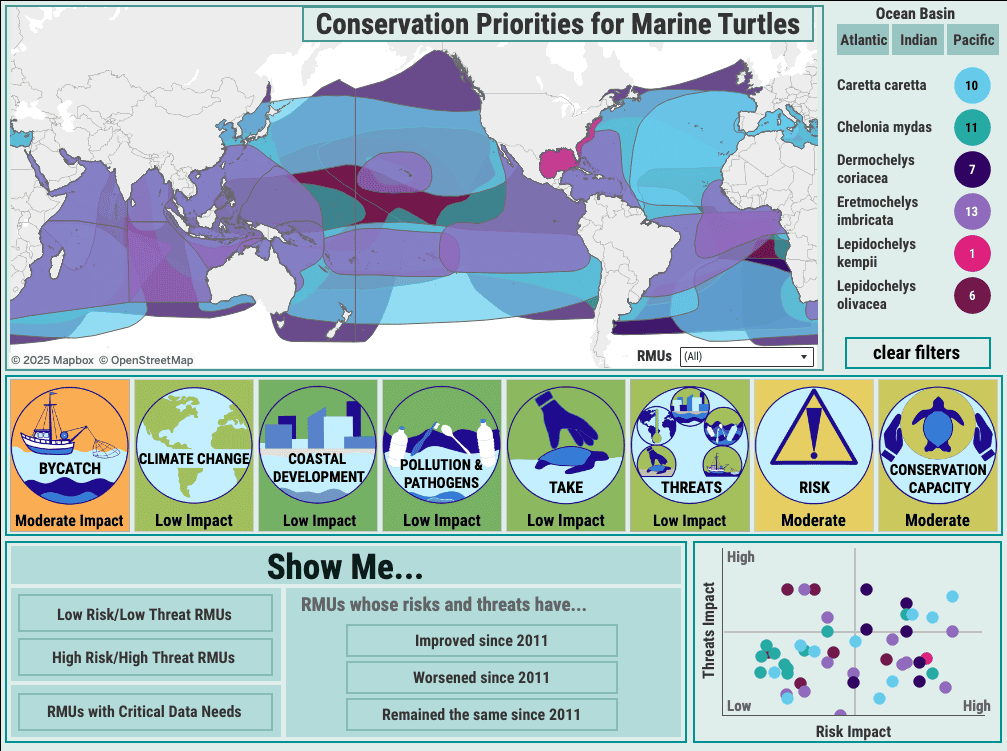April 17, 2025 • Program Updates
We are pleased to share that a new global assessment of sea turtle populations, resulting from more than a decade of collaborative research, has delivered a hopeful message: conservation is making a difference.
The study—published today in the journal Endangered Species Research—represents the most comprehensive evaluation to date of sea turtle population status and threats worldwide. Led by the IUCN’s Marine Turtle Specialist Group (MTSG) with support from Oceanic Society’s State of the World’s Sea Turtle (SWOT) program, the analysis reflects the efforts of nearly 150 experts across 50 countries.
Their findings show real progress: more than 40% of the 48 assessed sea turtle populations are now considered Low Risk–Low Threat, a dramatic improvement from just 23% in 2011.
“These findings showcase the incredible impact of conservation efforts worldwide,” said Bryan Wallace, lead author of the study. “They are a testament to the dedication of individuals and organizations working tirelessly to protect these ancient marine species.”
A Win for Sea Turtles—and for Conservation
“These findings showcase the incredible impact of conservation efforts worldwide,” said Bryan Wallace, lead author of the study. “It’s a testament to the dedication of individuals and organizations working tirelessly to protect these ancient marine species.”
The study attributes the improved status of many populations to targeted actions that address key threats. These include nesting beach protection, reducing incidental catch in fisheries, and minimizing light pollution and plastic waste in coastal zones.
This success underscores a critical truth: conservation works when it is strategic, science-based, and sustained over time.
But Not All Populations Are Thriving
Despite this encouraging progress, the study reveals persistent challenges—particularly in the Pacific Ocean, where nine populations remain in the High Risk–High Threat category. The study also revealed that leatherback turtles—the world’s largest and most wide-ranging species—are facing the highest combined risk and threat levels among all studied populations.

Although many sea turtle populations showed signs of improvement, that is not the case for leatherback turtles, which had the highest combined risk and threat levels among all studied populations. © Ben J Hicks
Globally, bycatch remains the most significant threat, along with coastal development, plastic pollution, climate change, and the illegal harvesting of turtles and their eggs.
A New Tool to Drive Impact
To translate this global assessment into actionable change, Oceanic Society and partners have launched a free, interactive Sea Turtle Conservation Priorities Dashboard at seaturtlestatus.org/cpp-dashboard. This online tool enables conservationists, policymakers, and the public to explore detailed population data, threats, and capacity across the globe.

A new interactive dashboard allows users to explore the data from the study to better understand the specific risks and threats that impact each sea turtle population.
By highlighting where and how to act, the dashboard empowers the global community to focus resources where they’re needed most.
How You Can Help
Sea turtle conservation isn’t just for scientists—it’s for everyone! You can help by:
- Reducing plastic waste to keep oceans clean;
- Supporting sustainable seafood choices;
- Protecting nesting beaches and coastal habitats;
- Getting involved with local conservation projects.
As lead author Bryan Wallace reminds us, “Slow and steady wins the race.” This study proves that conservation works, but we must stay committed to protecting these incredible marine creatures for generations to come.
Want to explore the full study and data? Visit seaturtlestatus.org to dive into the findings and explore the interactive dashboard.




